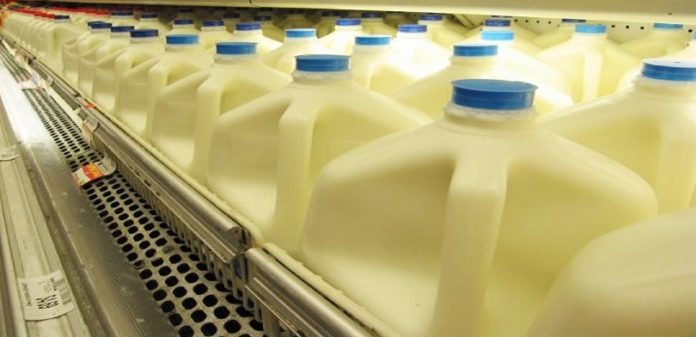
By: Mike Barrett, Natural Society.
Vegans may have had it right all along; while raw, organic milk offers numerous health benefits, a Harvard researcher and pediatrician argues that conventional milk and dairy products alike are a detriment to your health – thanks to added health-compromising sweeteners.
As David Ludwig mentioned in his research, which was published in the Journal of the American Medical Association Pediatrics, there have been countless pieces of research concluding the ill effects of sugar-sweetened beverages. The over-consumption of sugar has been tied to obesity, diabetes, inflammatory-related pain, and much more. And because of sugar’s negative effects on our health, even the United States Department of Agriculture, the American Academy of Pediatrics, and other organizations are recommending against consuming calories from sugary drinks.
The one calorie-containing beverage they still heavily promote, however, is reduced-fat milk, where the organization recommends drinking 3 cups daily. This is where Ludwig questions the scientific rationale for such recommendations.
“This recommendation to drink three cups a day of milk – it’s perhaps the most prevailing advice given to the American public about diet in the last half century. As a result, Americans are consuming billions of gallons of milk a year, presumably under the assumption that their bones would crumble without them,” says David Ludwig.
As far as Ludwig is concerned, if the USDA is recommending to drink reduced-fat milk, it is also inadvertently encouraging the consumption of added sugars – a piece of advice that goes against all the research saying not to consume sugar and sugar-sweetened beverages. The idea of consuming low-fat milk or chocolate milk cancels out the whole reasoning for the recommendation in the first place since the fats are simply being replaced with dangerous sugars.
“The worst possible situation is reduced-fat chocolate milk: you take out the fat, it’s less tasty. So to get kids to drink 3 cups a day, you get this sugar-sweetened beverage,” Ludwig says. ”…we can get plenty of calcium from a whole range of foods. On a gram for gram basis, cooked kale has more calcium than milk. Sardines, nuts seeds beans, green leafy vegetables are all sources of calcium.”
The Case Against Low-Fat Dairy, and Other Dangers of Milk
Harvard researcher David Ludwig certainly has a point in analyzing and ultimately criticizing the USDA’s recommendations, but there is much more to the full-fat vs reduced-fat argument for milk and dairy products.
There are plenty of reasons to avoid certain fats such as trans-fats and refined polyunsaturated fats in vegetable oils (like corn, soy, sunflower, and canola), but the evidence for moderate consumption of saturated fat, which is found in milk, coconut oil, and grass-fed land animals, is coming to the surface. While saturated fat was villainized for decades, a 2010 analysis published in the American Journal of Clinical Nutrition concluded that “there is no significant evidence for concluding that dietary saturated fat is associated with an increased risk of [coronary heart disease or cardiovascular disease].”
Further, there are numerous benefits to drinking full-fat dairy products. In it’s most pure state (raw, organic, and coming from grass-fed cows), full-fat dairy has been found in research to potentially promote heart health, control diabetes, aid in vitamin absorption, lower bowel cancer risk, and even aid in weight loss. But while pure dairy could promote your health, conventional dairy may prove damaging.
Before you consume more conventional dairy, please educate yourself as to what’s in your dairy. You’d be surprised that there could be 20+ painkillers, antibiotics, and much more lurking in your milk.
Additional Sources:
Credits:
This article first appeared on Natural Society.





Slavic/European people have known this all along and tried to tell you, America. But you never listen
What about other agricultural products humans ain’t supposed to eat like the grains and cereals that the industry paints as super foods. Before agriculture these supposed super foods were consumed by grazing herds not humans.
Friendly reminder: US =/= the whole world. The US has terrible food standards and there are no real regulation at all.
Every year thousands of tons of beef is being called back from the shelves because of contamination…..
Answer me this:
What animal continues to nurse from its mother on into adulthood?
What animal does so while nursing from a mother from a different species of animal?
Why do humans “need” to drink cows milk at ANY age past infantcy?
The fact is, we do not need milk after our own mothers!
What other animals read? What other animals have touched the moon? I understand your sentiment, but the argument is weak at best, but probably just invalid.
using ur logic we don’t need meat too.
We dont need meat either…
go watch cowspiracy.
http://notmilk.com
For your reading pleasure
on ne ne mange plus rien la viande a ceux si le lait a ceux si le ble a ceux siexct que doit t’on mange meme pas de la verdure il y a des pecticides on va mourir alors..
I work in the dairy industry and we do not add sugar to low fat milk. The only difference between whole milk and low fat is the amount of time it’s spins in a centrifuge. Chocolate milk of course does have added sugars.
After 10 minutes I gave up. Why oh why can’t you Americans cut the dross and get straight to the point. Even the spiel that I endured over 10 minutes could have been cut to less than a minute. Your attitude seems to be “why say in 10 words what can be said in 10,000”.
Skim milk has LESS SUGAR than whole milk. Skim milk has Sugars 12g. Whole milk has Sugars 13g. So, what sugar is added to skim milk that is not in whole milk?
cows are the symbol of capitalism such as oil and both are bad for the environment